.
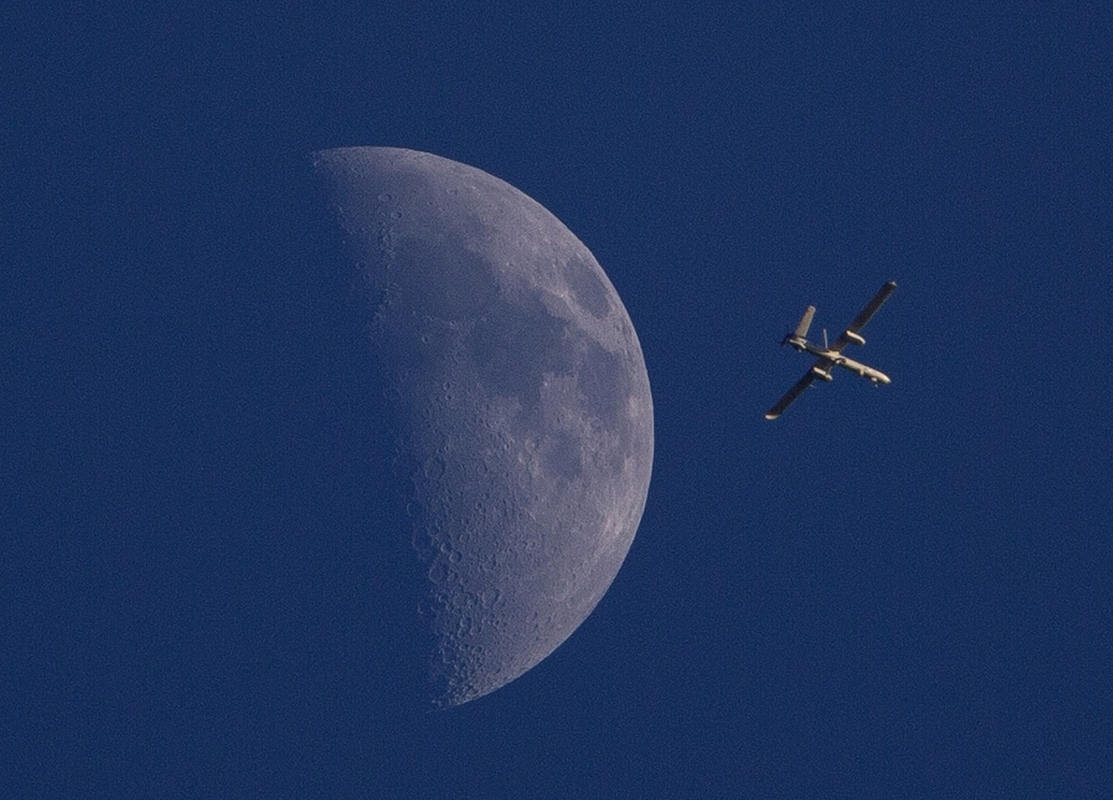 An Israeli drone circles over Gaza City on Sunday, August 3, 2014: photo by Dusan Vranic / AP, 3 August 2014
An Israeli drone circles over Gaza City on Sunday, August 3, 2014: photo by Dusan Vranic / AP, 3 August 2014
Asmaa Al-Ghoul: Never ask me about peace again
A first-hand account of the aftermath of an Israeli strike that killed nine members of the author's family
via Al-Monitor, 4 August 2014
Tears flowed until my body ran dry of them
when I received a telephone call on Aug. 3, informing me that my family
had been targeted by two F-16 missiles in the city of Rafah. Such was
the fate of our family in a war that still continues, with every family
in the Gaza Strip receiving its share of sorrow and pain.
My father’s brother, Ismail al-Ghoul, 60, was not a member
of Hamas. His wife, Khadra, 62, was not a militant of Hamas. Their sons,
Wael, 35, and Mohammed, 32, were not combatants for Hamas. Their
daughters, Hanadi, 28, and Asmaa, 22, were not operatives for Hamas, nor
were my cousin Wael’s children, Ismail, 11, Malak, 5, and baby Mustafa,
only 24 days old, members of Islamic Jihad, the Popular Front for the
Liberation of Palestine or Fatah. Yet, they all died in the Israeli
shelling that targeted their home at 6:20 a.m. on Sunday morning.
Their house was located in the Yibna neighborhood of the Rafah
refugee camp. It was one story with a roof made of thin asbestos that
did not require two F-16 missiles to destroy. Would someone please
inform Israel that refugee camp houses can be destroyed, and their
occupants killed, with only a small bomb, and that it needn’t spend
billions to blow them into oblivion?
Rescue
workers search for victims as Palestinians gather around the wreckage
of a house destroyed in an Israeli airstrike that killed at least nine
members from the al-Ghoul family, in Rafah, southern Gaza Strip, August 3,
2014: photo by Ibraheem Abu Mustafa / Reuters, 3 August 2014
If it is Hamas that you hate, let me tell you that the people you are killing have nothing to do with Hamas. They are women,
children, men and senior citizens whose only concern was for the war to end, so
they can return to their lives and daily routines. But let me assure you
that you have now created thousands -- no, millions -- of Hamas
loyalists, for we all become Hamas if Hamas, to you, is women, children
and innocent families. If Hamas, in your eyes, is ordinary civilians and
families, then I am Hamas, they are Hamas and we are all Hamas.
Throughout the war, we thought that the worst had passed, that this
was the pivotal moment when matters would improve, that they would stop
there. Yet, that real moment of pain, of extreme fear, was always
followed by something even worse.
Now I understood why the photographs of corpses were so important,
not only for international public opinion, but for us, the families, in
search for an opportunity to bid farewell to our loved ones, so
treacherously killed. What were they doing in those last moments?
What did they look like after their death?
Palestinian man carries a body of Palestinian kid from Goul family -- killed while he was sleeping in his house: photo by Anadolu Agency via Dr Bassel Abuwarda on twitter, 4 August 2014
I discovered the photos of my dead relatives on social networking
sites. The bodies of my cousin’s children were stored in an ice cream
freezer. Rafah’s Abu Yousef al-Najjar Hospital was closed after being
shelled by Israeli tanks, and the Kuwaiti Hospital that we visited just a
day earlier had become an alternate venue, where this freezer was the
only option available.
Al-Najjar’s director, Abdullah Shehadeh, said, “We decided
to move the patients when shells hit the main gate. Some patients, out
of fear, ran out, despite the gravity of the security situation. We are
now working out of this ill-equipped hospital.”
The Emirati Red Crescent Maternity Hospital, west of Rafah, has
been transformed into a large container for corpses, with fruit and
vegetable freezers filled with dozens of bodies.
Israel massacred so many in Rafah that we had to use cooling trucks and ice cream refrigerators to preserve bodies: photo by Dr Belal Dabour via twitter, 3 August 2014
I saw corpses on the floor, some with nametags on their chests, while
others remained unknown. We held our noses, for the stench was
unbearable, as flies filled the air.
Israel massacred so many in Rafah that we had to use cooling trucks and ice cream refrigerators to preserve bodies: photo by Dr Belal Dabour via twitter, 3 August 2014
Ibrahim Hamad, 27, removed his five-year-old son’s shroud-wrapped
body from a vegetable freezer. Fighting back tears, he said,
“He died as a result of a reconnaissance drone missile attack. His body
has been here since yesterday. The dangerous situation prevented me from
coming to take him any sooner.”
this photo touch your humanity? Does it touch your love for ice cream at least?: photo by Dr Belal Dabour via twitter, 3 August 2014
I thank God that my relatives were quickly buried, and that my
cousins Mustafa, Malak and Ismail did not remain long in a freezer, lest
their bodies freeze, and their souls now rest in peace, leaving us with
nothing but the silence of death and bodies forever trapped in the
postures of their passing.
On the fifth day of the war, when I went to write my Rafah report about the shelling of the Ghannam family,
I stopped by to visit my cousin’s house. I saw my relatives and we took
photographs together. During the war, my cousin Wael’s wife had given
birth to twins, Mustafa and Ibrahim, who were like two tiny angels,
harbingers of hope and joy.
How could I have known that this would be our last meeting? I wish I
had stayed longer and talked to them some more. Hanadi, Asmaa, my uncle
and his wife laughed as they joked about the twist of fate that brought
us together in the middle of a war, at a time when Israeli occupation
forces had not yet begun perpetrating their wanton war crimes against
Rafah.
Endings are so strange, as are living moments that suddenly become
relegated to the past. We will never see them again, and the pictures
that I took of the twins are now so precious, as one of them, Mustafa,
was killed, while the other, Ibrahim, remained alive.
I wonder how they could differentiate between them, for they looked
so much alike. Who identified them when their father died and their
mother lay wounded in intensive care? Who was Mustafa, and who was
Ibrahim? It was as if they had merged upon one twin's death.

A
relative carries the body of a young girl during the funeral of at
least 9 members of the same al-Ghul family who died after their house
was hit by an Israeli airstrike in Rafah in the southern Gaza Strip, on
August 3, 2014: photo by PressTV, 3 August 2014
In the photos taken after their death, my family looked so peaceful,
asleep with their eyes closed. None of them were disfigured or burned,
unlike hundreds of dead children and civilians that US-made weapons
killed before them. We wondered if they died in pain. What happened when
the missile, carrying tons of explosives, impacted their modest house
and exploded, creating air pressure so fierce that their internal organs
burst? Their suffering was perhaps lessened by the fact that they were
sleeping.
I didn't see them when I went to Rafah on August 2. I wrote about the
death of the Ayad Abu Taha family, which was targeted by warplanes, and
saw the corpse of Rizk Abu Taha, one year old, when it arrived at the
Kuwaiti Hospital.
I observed him at length. He looked alive. One could see that he had
been playing when he died, dressed in his pink pants. How could he be at
such peace? The bodies of war victims look so different from how they
appear on television. They are so real, so substantial, suddenly there
before you, without any newscast introductions, music or slogans.
Angelina Jolie is heart-broken about the suffering in Gaza: photo by Dr Basel Abuwarda via twitter, 3 August 2014
Bodies lay everywhere, and it was if everything in life had been to
prepare us for this moment. Suddenly, the dead left their personal lives
behind: their cell phones, homes, clothes, perfumes and daily chores.
Most importantly, they left the fear of war behind.

Under what law this is acceptable?!
A child waiting for his dead mother to wake up.
HEARTBREAKING: photo by Dr Basel Abuwarda via twitter, 3 August 2014
Distances in the small Gaza Strip have grown larger, distances and
time expanding as a result of the fear and death that shrank the life
expectancy of the populace. We were unable to join the family for the
funerals. My uncle, Ahmad al-Ghoul, later told me over the phone,
“Because of the inherent danger, our goodbyes to them lasted mere
seconds. Malak’s eyes laid open, as if to ask, 'What wrong did I
commit?'”

Displaced kids at UN shelter looking at the warplanes in the sky with no FEAR. They get used to them! THIS IS NOT NORMAL: photo by Dr Basel Abuwarda via twitter, 3 August 2014
I was born in 1982, in that same house in Rafah’s refugee camp, where
the family’s large household expanded. I grew up there, and everything
else grew with us: the first intifada, the resistance, my nearby school
that I walked to every day. There, I saw my first-ever book library.
There, I remember seeing my grandfather fall asleep as he listened to
the BBC. And there, I laid eyes on the first Israeli soldier in my life,
striking my grandfather to force him to erase the national slogans that
adorned the walls of our refugee camp home.
Now,
the house and its future memories have been laid to waste, its children
taken to early graves. Homes and recollections bombed into oblivion,
their inhabitants homeless and lost, just as their camp always had
always been. Never ask me about peace again.
Asmaa al-Ghoul is a columnist for Al-Monitor's Palestine Pulse and a journalist from the Rafah refugee camp based in Gaza
Palestinians grieve over
the death of their relatives killed in an Israeli strike, in the Kuwaiti
hospital in Rafah refugee camp, southern Gaza Strip, Sunday, August 3,
2014: photo by Khalil Hamra / AP, 3 August 2014
The bodies of the Al Ghoul family, killed early Sunday morning, were
lined up on the floor of the Kuwaiti hospital in Rafah. Doctors wiped
dried blood from the faces of three men. Outside the hospital, men and
children shed tears while sobbing women cradled the smallest of the
dead, kissing their faces. In another hospital room at the hospital, at least four children were
piled into an ice cream freezer, all wrapped in white cloth drenched in
blood. Doctors say that morgues in Rafah are at maximum capacity.
"don't be afraid I'm still alive to protect u, Allah with us" he whispered: photo via Isra Elaila on twitter, 4 August 2014

Smoke rises after an Israeli airstrike in Gaza City, Sunday, August 3, 2014: photo by Dusan Vranic / AP. 3 August 2014
Israeli army summarily executed fleeing civilians in southern Gaza: photo by Joe Catron via twitter, 4 August 2014
Only in Gaza, you let the sky to be your limit: photo by Inas Safadi via twitter, 3 August 2014
Put yourself in his shoes, what would you do if you lose your child?: photo via Anonymous on twitter, 4 August 2014
Ya Allah ease their affair: photo by Nafeesa Suleiman via twitter, 4 August 2014

Death toll in Gaza Strip reaches 1,865: photo via ISM Palestine on twitter, 4 August 2014

"Sitting in what used to be my living room": photo by FreePalestine via twitter, 4 August 2014

Israeli soldiers shoot and kill fleeing civilians: photo by FreePalestine via twitter, 4 August 2014

What more cruelty do we need to see to stand up for Humanity!: photo via Omar Salem on twitter, 4 August 2014

This boy lost all his family and both his eyes.
Plastic surgeons at Shifa reconstructed his face, but he won't see it!: photo by Dr Belal Dabour via twitter, 3 August 2014
Reborn: photo by Dr Belal Dabour via twitter, 3 August 2014

al-Nada Towers.
This photo should give a clue as to why UNRWA estimates that Gaza reconstruction requires 30 years: photo via Dr Belal Dabour on twitter, 3 August 2014
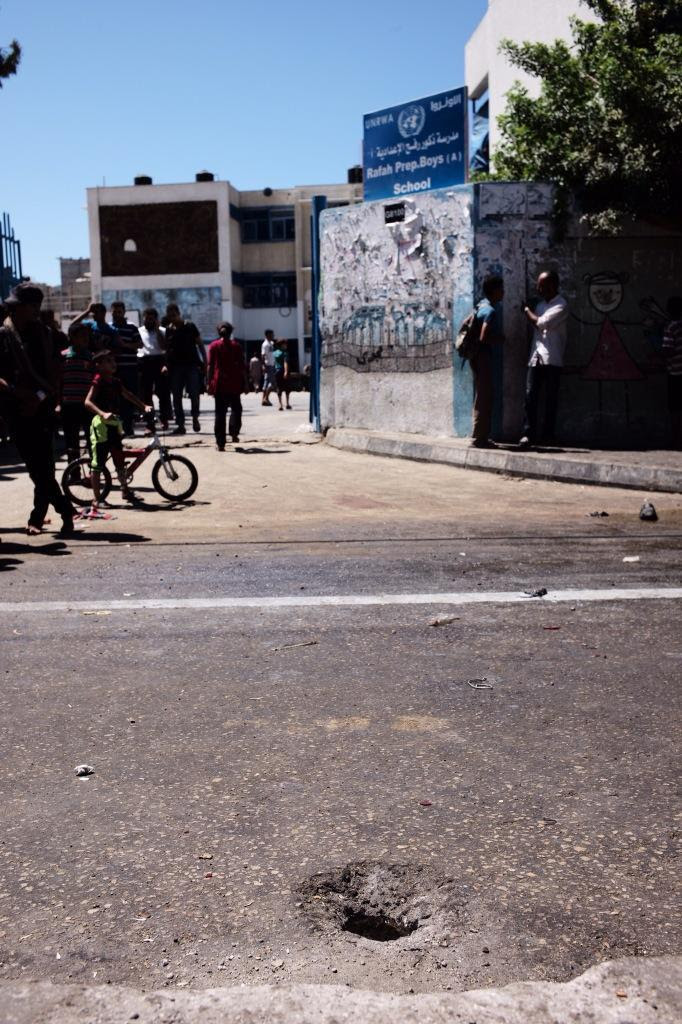
First Israel denies it, media adopts their story.
Now Israel admits targeting UN school in Rafah this morning. Media?: photo by Dr Belal Dabour via twitter, 3 August 2014

Dr. Moataz Harara, a friend, a classmate and a fellow doctor at Shifa. This is his father checking on what WAS their house: photo by Rami Abu Marahil via Dr Belal Dabour on twitter, 3 August 2014

This
house once sheltered the young talented poet Anas Abu Samhan. Don't
despair my friend.. this too shall pass: photo via Dr Belal Dabour on
twitter, 3 August 2014
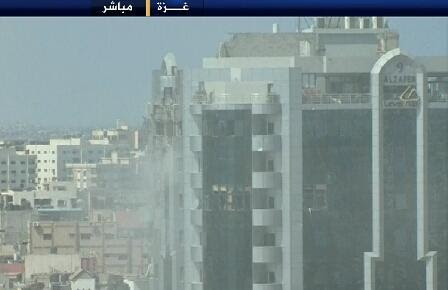
This
famous building lies at the very heart of Gaza City. It's now being
shelled with artillery, I hear it from Shifa!: photo via Dr Belal Dabour
on twitter, 3 August 2014
.
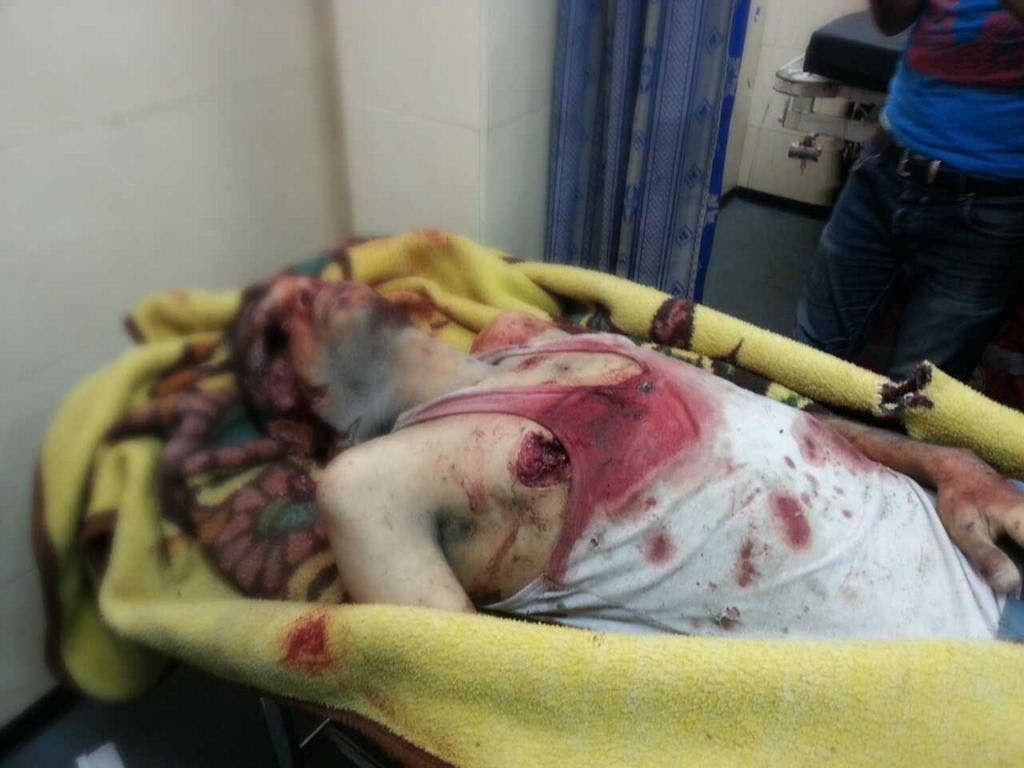
One of today's martyrs. I am sure he was handsome; Israel didn't like that: photo by Dr Belal Dabour via twitter, 2 August 2014
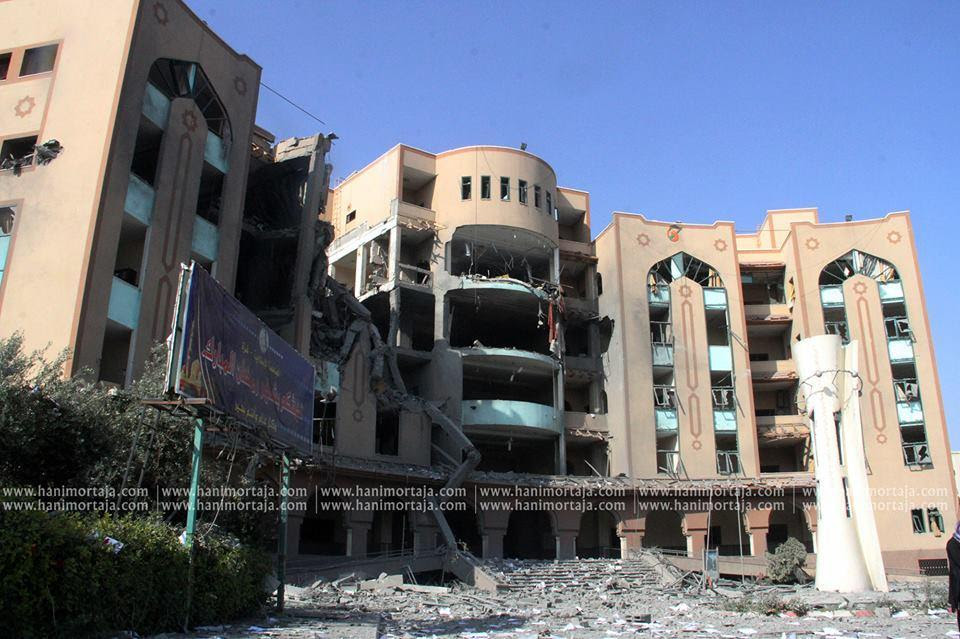
I woke up to find that Israel has bombed my university. They've also killed another 50 Palestinians overnight!: photo via Dr Belal Dabour on twitter, 2 August 2014

Used to be a civil society organization in Beit Hanoun; Israel didn't like that: photos by Dr Belal Dabour via twitter, 2 August 2014

But first, let me take a selfie: photo by Dr Belal Dabour via twitter, 2 August 2014

This was a famous biscuits and ice cream factory in Gaza, before/after Israel left its mark: photos via Dr Belal Dabour on twitter, 2 August 2014
 Sleeping on the floor at Shifa hospital was this kid. The only thing that survived from his home was his cat: photo by Dr Belal Dabour on twitter, 31July 2014
Sleeping on the floor at Shifa hospital was this kid. The only thing that survived from his home was his cat: photo by Dr Belal Dabour on twitter, 31July 2014

Five month old baby was severely injured by an Israeli attack to his family house while sleeping.
HE'S TRYING TO SURVIVE NOW: photo by Dr Bassel Abuwarda via twitter, 4 August 2014

Ministry of Health: 17 hospitals and 36 ambulances have been targeted since the beginning of the Israeli aggression: photo by Dr Basel Abuwarda via twitter, 3 August 2014

Eleven
journalists and nineteen medical staff have been killed so far. They
are trying not only to hide the truth but also to bury it: photo by Dr Basel Abuwarda via twitter, 3 August 2014

Israel continues targeting civilians' houses: today in the Saudi Quarter in Rafah: photo by Dr Basel Abuwarda via twitter, 3 August 2014

Even ambulances have been damaged by Israeli rockets: picture today from Northern Gaza: photo by Dr Basel Abuwarda via twitter, 3 August 2014

UN spokesperson: We need 30 years to rebuild Gaza: photo by Dr Basel Abuwarda via twitter, 3 August 2014

UN spokesperson: We need 30 years to rebuild Gaza: photo by Belal Khaled via Dr Basel Abuwarda on twitter, 3 August 2014
UN spokesperson: We need 30 years to rebuild Gaza: photo by Safa Images via Dr Basel Abuwarda on twitter, 3 August 2014
UN spokesperson: We need 30 years to rebuild Gaza: photo by Mohamed Abed / AFP via Dr Basel Abuwarda on twitter, 3 August 2014
Israel is creating a generation of disabled adults … and
for these kids, there is no one left to care for them: photo by Dr
Basel Abuwarda via twitter, 3 August 2014







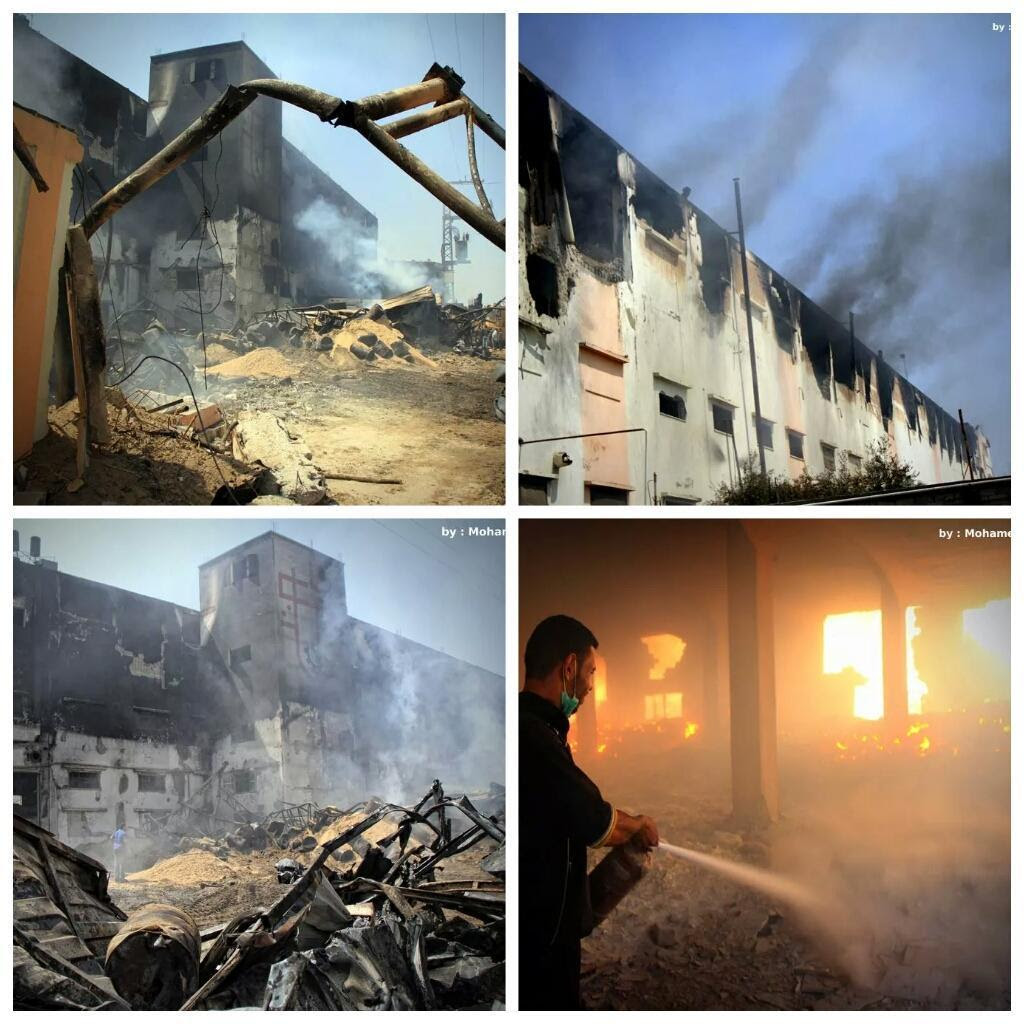





































Some before and after photos of the destruction as seen from the impassive robotic heavens -- the sort of thing you might see in a documentary about historical war crimes (though of course they'd never be called that if committed by Israel, the US, or whatever that other useless special friend was called... BBC was it?)
ReplyDeleteNot forgetting that those "after" photos were taken two weeks ago... that is, only about one-third of the way into the present state of devastation in the particularly target-rich neighborhoods... the sight of which might wring a tear from even the robot eye in the sky.
ReplyDeleteAnd just imagine what Rafah must look like from up there, having been reduced to ruin in the course of the enactment of the Hannibal Protocol... ya gotta love that cold-blood-drunk lust when it really gets into gear! Weapons manufacturers everywhere happier than butchers at a barbecue!
And by the by, talking of our new robot pets, just wondering, do you suppose at drone college they have Civics classes?
And check this out...
ReplyDeleteTom,
ReplyDelete"What were they doing in those last moments? What did they look like after their death?"
"baby Mustafa, only 24 days old"
"Palestinian man carries a body of Palestinian kid from Goul family -- killed while he was sleeping in his house"
"The bodies of my cousin’s children were stored in an ice cream freezer"
"so many in Rafah that we had to use cooling trucks and ice cream refrigerators to preserve bodies"
"A relative carries the body of a young girl during the funeral of at least 9 members of the same al-Ghul family who died after their house was hit by an Israeli airstrike in Rafah in the southern Gaza Strip, on August 3, 2014"
"In the photos taken after their death, my family looked so peaceful, asleep with their eyes closed."
"A child waiting for his dead mother to wake up."
"Put yourself in his shoes, what would you do if you lose your child?"
Baroness Warsi has shown herself to be that most rare of creatures: a principled Tory.
ReplyDelete"If it is Hamas that you hate, let me tell you that the people you are killing have nothing to do with Hamas. They are women, children, men and senior citizens whose only concern was for the war to end, so they can return to their lives and daily routines. But let me assure you that you have now created thousands -- no, millions -- of Hamas loyalists, for we all become Hamas if Hamas, to you, is women, children and innocent families. If Hamas, in your eyes, is ordinary civilians and families, then I am Hamas, they are Hamas and we are all Hamas".
There have been similar recruitment drives by proxy in the past (and no doubt the old imperial whitewash will come out some years hence).
WB, on that note (re Northern Ireland), on 29 July there appeared a curious piece -- interesting not so much because revelatory in itself (merely a reasonable exposition of inarguable truth), but because it appeared in, of all places, The New Yorker, by Rashid Khalidi:
ReplyDelete"In the past seven or more years, Israel has besieged, tormented, and regularly attacked the Gaza Strip. The pretexts change: they elected Hamas; they refused to be docile; they refused to recognize Israel; they fired rockets; they built tunnels to circumvent the siege; and on and on. But each pretext is a red herring, because the truth of ghettos -- what happens when you imprison 1.8 million people in a hundred and forty square miles, about a third of the area of New York City, with no control of borders, almost no access to the sea for fishermen (three out of the twenty kilometres allowed by the Oslo accords), no real way in or out, and with drones buzzing overhead night and day -- is that, eventually, the ghetto will fight back. It was true in Soweto and Belfast, and it is true in Gaza. We might not like Hamas or some of its methods, but that is not the same as accepting the proposition that Palestinians should supinely accept the denial of their right to exist as a free people in their ancestral homeland.
"This is precisely why the United States’ support of current Israeli policy is folly. Peace was achieved in Northern Ireland and in South Africa because the United States and the world realized that they had to put pressure on the stronger party, holding it accountable and ending its impunity. Northern Ireland and South Africa are far from perfect examples, but it is worth remembering that, to achieve a just outcome, it was necessary for the United States to deal with groups like the Irish Republican Army and the African National Congress, which engaged in guerrilla war and even terrorism. That was the only way to embark on a road toward true peace and reconciliation. The case of Palestine is not fundamentally different."
(Rashid Khalidi is the Edward Said Professor of Arab Studies at Columbia University and the editor of the Journal of Palestine Studies, and was an adviser to the Palestinian delegation at the Madrid-Washington Palestinian-Israeli negotiations of 1991-93. His most recent book is “Brokers of Deceit.”)
And yes, when its first representation of conscience turns out to be coming from a Tory, that can't be a very solid government you're having there. Oh, Cameron lost something from his cabinet. Too bad it was the wrong something. I thought that's where he kept those fossilized miniature testicles.
The supposed "wave of relief" now washing over the world seems very much a wave of continuing irresponsibility, the relief mainly a matter of being pleased to have this potentially troubling, guilt-making story removed to the back pages, so that the proper businesses of lies and entertainment may resume.
And by the way, as you're climbing back into your tanks, O Light Unto the Nations, dare we mention the little matter of reparations? Or have you not heard of that term.
When the bill for the first payment (now estimated to come in at c. $6-8b) on the reconstruction of the ruins of Gaza, I doubt we will be seeing a single soul-searching think piece, whether in the relatively elevated aerie of Haaretz or in the Times of Israel or Jerusalem Post, as to how Israel ought to be ponying up every last shekel of that tab, and please multiply that by about ten for the p & s, thanks very much.
As for the present peace on the ground...
Would Queens I wonder feel peaceful with the electricity out, vast fleets of killer Mershava tanks milling about along the East River, and hundreds of robot craft still buzzing with menace in the dark skies above?
For it seems the drones did not receive the "pull back" order, but you know how it is with these brilliantly precise new technologies, a few bugs still to work out, just a matter of small details.
Finding out what's happening in Gaza today is not easy. But if you check it out, you will find that there are literally thousands of terrorized, stranded people in Gaza who continue, in the face of an assault that will one day be ranked among the most salient calculated state atrocities of a period of history not noted for kindness, to communicate with each other -- and, with us, the "outside world".
ReplyDeleteHere for example are the notes sent over the past 90 minutes or so by Sarah Ali.
Here's how Sarah Ali describes herself:
"Muslim. Literature. Linguistics. Nature. Kids."
(Typical terrorist, yeah?)
Sarah Ali @Saritah_91 · 39m
Earlier today my nephew told me to charge my phone "before electricity goes out". He's 5 & he thinks this is normal.
45m
Never saw Gaza this dark, even during pre-attack daily power cuts. Small lights are turned off; batteries dying. Darkness is all I can see.
54m
It's so dark I can't see my hand. I stare at the stars outside my window. An object (drone or F16) hovering. No bombing, just terror.
57m
Drones cause headaches, insomnia, buzzing thru' your head that drives you crazy. They remind you that Israel's always there, always watching
1h
Ceasefire or not, Israeli drones never go away. And they are the most horrible of all.
Oh well, I had so wanted to believe Hilton's comment yesterday re. the brutal conduct of the rogue terror state Israel, self- appointed Gestapo of the world, in overseeing the concentration camp which is occupied Gaza, causing minds to change in the American Jewish community.
ReplyDeleteI understand that American Jews are somehow "different".
My wife's family suffered dispossession, displacement, beheading, gas chamber, at the hands of the Nazis.
Those who survived remained compassionate people. Committed to peace. But of course, they were Europeans, they'd known actual suffering -- something quite apart from persecution mania.
Of course everyone knows but fears to come out and say that it's only the massive pressure of American Zionists upon the American government that allows the Israeli occupying force in Palestine to continue to behave with impunity.
After all, quite apart from any possible moral issues, that annual $3.1 billion injection of "military aid" -- including the redundant supplying of the most devastating and inhuman "experimental" "conventional" weapons ever known, not to mention the countless further costs in supplementary armaments, available at all times in support of the Total Hasbara (bombs plus lies = Israeli conception of military strategy), if directed instead to a few of this country's present crying needs (health care, public transport, the list is long) -- might well have a chance of actually doing some good.
But who's kidding whom?
Now that talk of reconstruction has begun, which countries are stepping up to volunteer to help with the staggering costs?
Well, Norway for one. Norway, which has already provided the incredible Dr. Mads.
Today I was talking with the other two residents of this block who have survived life on the freeway feeder the longest.
One was the guy next door, whose dad was killed attempting to cross it (run over, as was I, though in my case without the bonus of ending up dead -- merely crippled), the other a woman down the block, who'd been born and raised in Germany.
She said that the Gaza situation has deeply affected her. "Every time I hear a plane going over, I imagine what it would be like to be in Gaza. Every time I feel hungry, I imagine what it would be like to be in Gaza."
She said that to people in Germany, the stage of offering reparations to the victims of their particular brand of state terror had been a necessary first step in coming to terms with collective guilt resulting from having wrought collective punishment upon a people. "So, of course, the Jews had to be compensated."
She was saying -- reparations, yes, of course, first step, absolutely necessary.
But since when has the ultimate Schnorrer State, Israel, reimbursed any of its victims?
No, with these charmers it's "We destroy, you pay."
So, to think that minds are changing... a shred of hope.
Then I see this in the morning paper:
Marchers gather to support Israel at S.F. rally (SF Chronicle)
Right.
A word about the author of this piece: a Gazan secular feminist writer, not so old in years but obviously steeped in the experience of this world. Much of what she says can perhaps be viewed in a somewhat different light when her background is taken into account, along with the personal journey that seems to have brought her to this point from that suggested in this Mother Jones piece of three-and-a-half years ago.
ReplyDeleteIsraeli peace movement spat at and marginalised in a time war--Giles Fraser in Tel Aviv talking with Gideon Levy and Amos Oz: Guardian 6 August 2014
ReplyDeleteLevy's unpardonable crime is vocal opposition to the war and to the bombing of Gaza. According to recent polls support for the military operation in Gaza among the Jewish Israeli public stands somewhere between 87% (Channel 10 News) and 95% (Israel Democracy Institute). Even those who are secretly against the war are cautious about voicing their opinion openly.
"What is different this time is the anti-democratic spirit. Zero tolerance of any kind of criticism, opposition to any kind of sympathy with the Palestinians," says Levy. "You shouldn't be surprised that the 95% [are in favour of the war], you should be surprised at the 5%. This is almost a miracle. The media has an enormous role. Given the decades of demonisation of the Palestinians, the incitement and hatred, don't be surprised the Israeli people are where they are."
"The young people are the worst. More ignorant. More brainwashed. They have never met a Palestinian in their lives".
Thank you, Tom, for keeping the heinous crimes of Israel before our eyes--it's revolting to think the powers that be simply turn and look the other way when faced with such atrocities.
ReplyDeleteVassilis,
ReplyDeleteCan't keep out of mind this past month the words of Thoreau to Emerson, from Staten Island, 8 June 1843 -- I am ashamed of my eyes that behold it.
(Of course he was talking about New York not Gaza, still... that feeling. Burn out my eyes. The photo of the boy with eyes gone, taken by the doctor who had somehow saved his face -- but just as well the boy was never going to have to see it.)
ReplyDeleteI am ashamed down to the core of my soul...that this country I have always loved Could turn into such a bloodless Beast as This . For Why ? For Who ? Where does it All END ? Can This Possibly ever be forgiven In a million years of repentance ? I don`t believe so. This Monstrosity has TO Go. Even if it requires An obliteration of This Country And Every other War-mongering Entity on the face of This EARTH. Won`t we ever learn there is Going to be A Reckoning That Will never END /
ReplyDeleteIn the long run I don't think it will be forgiven or forgotten quite so easily as seems to be assumed now among those who are responsible.
ReplyDeleteBut that doesn't help with the present or near future, alas.